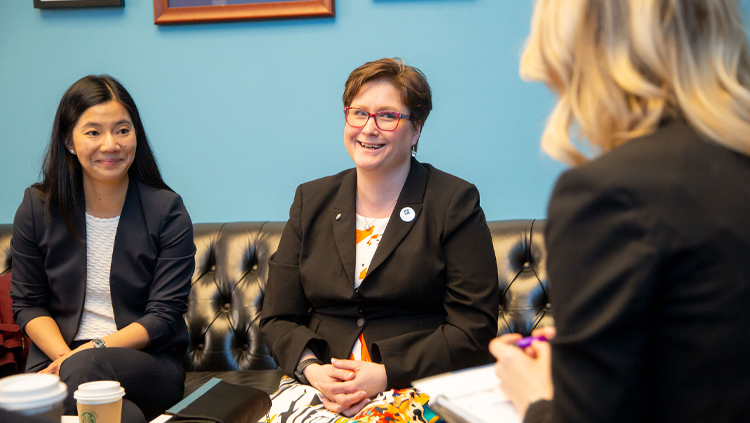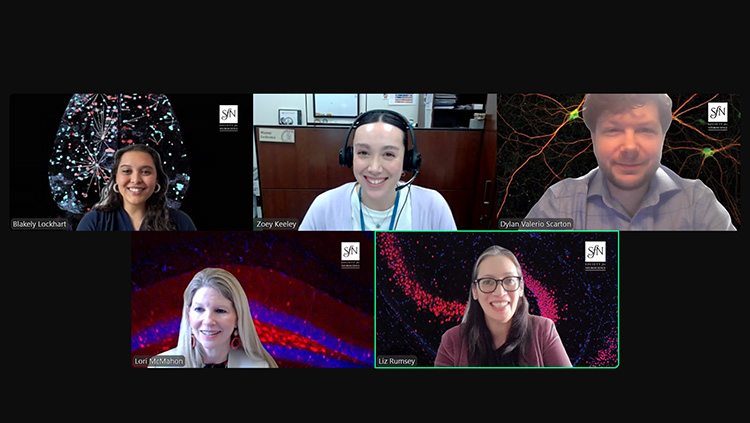Meet the ECPAs: Rebecca Ravenelle
- Featured in:
- Meet the Early Career Policy Ambassadors
This interview is part of the “Meet the ECPAs” collection, which spotlights current Early Career Policy Ambassadors (ECPA) on their careers, interest in science policy, and current advocacy work. Read onto learn about Rebecca Ravenelle, a postdoctoral research fellow in the T32 Late-Life Neuropsychiatric Disorders program at Columbia University.
Describe your journey in neuroscience and current research.
I was first introduced to neuroscience research as an undergraduate at UMass-Boston. As a biology major, I decided to take a few psychology courses to complete general requirements, and I really enjoyed my behavioral neuroscience class taught by Tiffany Donaldson. She noticed I was doing well and invited me to join her lab as an undergraduate. I was fortunate enough to be hired as her lab manager and research technician following graduation, and while there, I completed projects examining how biological factors, such as sex, interact with environmental characteristics to influence vulnerability to psychiatric disorders. I knew I wanted to make research a career and moved to New York for graduate school. I completed my doctoral work at the City University of New York where I worked with Nesha Burghardt and Ekaterina Likhtik to identify neural mechanisms contributing to sex differences in fear learning. Currently, I am a postdoctoral research fellow in Christine Ann Denny’s laboratory at Columbia University Irving Medical Center & New York State Psychiatric Institute. I am still interested in exploring sex differences in my research and am now working on the development of novel therapeutics to treat psychiatric disorders that emerge in late-life, with a focus on late-life depression.
Why are you interested in science policy and advocacy?
I became interested in science policy and advocacy after serving on the STEM Advisory Board for the American Association of University Women (AAUW, 2022-23). The subcommittee on which I contributed completed a review and gap analysis on the current STEM education and career landscapes for girls and women. Ultimately, I recognized that improving education and career options in neuroscience, or any STEM field, must begin with policy decisions to fund meaningful early math and science programs for all students. Additionally, as a postdoctoral research fellow I have witnessed first-hand the exodus of PhD-level neuroscientists from academia that will only further exacerbate the underrepresentation of women in tenure-track faculty positions. Reversal of this trend will require top-down policy changes to improve the compensation and structure of neuroscience postdoctoral and early career positions.
What does being an ECPA mean to you? Can you describe your two advocacy-related projects you proposed as part of the program?
By participating in the ECPA program, I hope to become better at communicating to non-scientists why investment in neuroscience research is important and worthwhile for communities. Effective communication regarding scientific research is necessary to continue to build public trust in science and science-related policies in the United States.
Having previously worked at Hostos Community College, one of several community colleges in the City University of New York system, I realized there is high variability in students’ knowledge regarding STEM careers. As part of the ECPA program, I am looking forward to coordinating with leadership at community colleges to host information sessions where a panel of neuroscientists will discuss their education and career paths. Additionally, I hope to use my advocacy training to meet with local representatives to bolster support for STEM education throughout New York as research has shown that early STEM opportunities can change the trajectory of education and career options, particularly for young girls. Finally, I look forward to presenting my ECPA related work later this year at Neuroscience 2024 in Chicago.
Why do you feel it’s important to speak to your federal policymakers on the importance of continued support of federal investment in biomedical research?
As neuroscientists, we appreciate that federal investment in biomedical research is vital to drive advancement in our understanding of neurological and psychiatric illness which ultimately leads to improved treatments for patients. However, it is important to speak with our policymakers to let them know how vital sustained funding is to maintain our research programs. Additionally, federal funding is also an important provider of economic growth, and our policymakers may not be aware of how economically vital research funding can be for their constituents. For example, in 2023, NIH funding supported over 42,000 jobs in New York.
How has being an SfN member benefited you in both your professional career and advocacy journey?
As an undergraduate, the first conference I attended was SfN’s annual meeting. At first, I was slightly overwhelmed, but I gradually started enjoying learning from everyone I spoke with, and I had a great time exploring the graduate fair after giving my poster presentation. Spending time at the annual meeting allowed me to more seriously consider attending graduate school. Now as a postdoctoral fellow and ECPA participant, SfN has provided direct support through advocacy training making, preparing me to speak with policymakers and non-scientists about the importance of neuroscience research.
What is one fun fact about you that you would like to share?
In college, I worked at the New England Aquarium in the medical center. Although I ultimately decided not to pursue the veterinary field professionally, it remains one of the most interesting and enjoyable jobs I have ever had.










